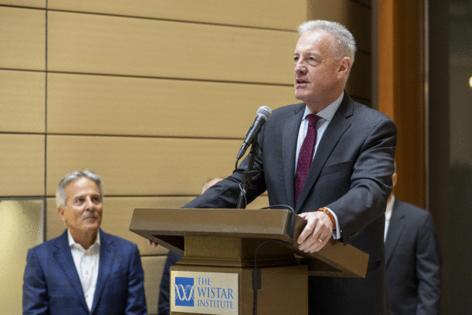Pa. scientific researchers urge Congress to increase funding to the NIH as the shutdown ends
Published in News & Features
The record-breaking federal government shutdown marked yet another impediment to scientific research efforts at the Wistar Institute this year.
After a year in which federal research funding was thrown into uncertainty, with funding freezes and canceled grants, the shutdown meant that the National Institutes of Health were not able to review grant proposals from scientists around the country.
The ongoing precarity of federal funding — with President Donald Trump proposing another round of cuts at the NIH in the next fiscal year — had Wistar president and CEO Dario Altieri worried about the Philadelphia biomedical research institute’s future.
Wistar wasn’t significantly impacted by this year’s initial research cuts. Still, when the federal government shut down, grant proposals that Wistar scientists expected federal officials to review languished, he said.
“Everything came to a complete stop,” he said.
And now, with the shutdown over, Altieri and his counterparts at a statewide coalition of scientific research institutions and advocacy organizations are urging federal lawmakers to commit to funding the NIH as they renew budget talks.
The Pennsylvania Ad Hoc NIH Funding Advocacy Coalition in August urged Pennsylvania representatives on the House Appropriations Committee to vote to give $47.2 billion to the NIH in the forthcoming fiscal year, following the lead of their Senate colleagues.
That move would increase funding for the NIH by $400 million — instead of cutting it by 40%, as Trump had proposed.
On Thursday, the coalition sent a second letter to Pennsylvania’s federal lawmakers, again encouraging them to fund the NIH at that level.
The initial letter’s signatories included the University of Pennsylvania and Children’s Hospital of Philadelphia, along with Wistar and other specialized research centers and advocacy groups.
Penn and CHOP officials did not sign the second letter. In a statement, Penn officials said they had signed other letters supporting increases in NIH funding and continue to engage in “direct advocacy” on the matter.
CHOP said that preserving NIH funding is “critically important” and that its officials and clinicians traveled to Washington, D.C., to meet with legislators on the issue last week.
“No matter how we advocate, we always stand with the entire biomedical research community in advocating for funding needed to save lives and cure disease,” the hospital said in a statement.
Altieri again signed the latest letter from the ad hoc coalition, joined by officials at the American Association for Cancer Research, the Pennsylvania Biotechnology Center, and the University City Science Center, among others. NIH funding is a bipartisan issue for the biomedical research coalition.
“This is not a red state or blue state issue. It’s about the health of everyone in the Commonwealth,” Altieri said.
He added that scientists across the state have dealt with unprecedented unpredictability over their funding sources this year. “Everyone longs for some level of predictability, of having a norm, an expected outcome of a process that has been going on for decades.”
Altieri said he hopes lawmakers will follow the example of area research associations who often collaborate.
“There are so many academic institutions in Pennsylvania that cover so many different aspects of education, training, and research. We really want elected lawmakers on both sides of the aisle to work together like we do,” he said.
_____
©2025 The Philadelphia Inquirer. Visit inquirer.com. Distributed by Tribune Content Agency, LLC.







Comments